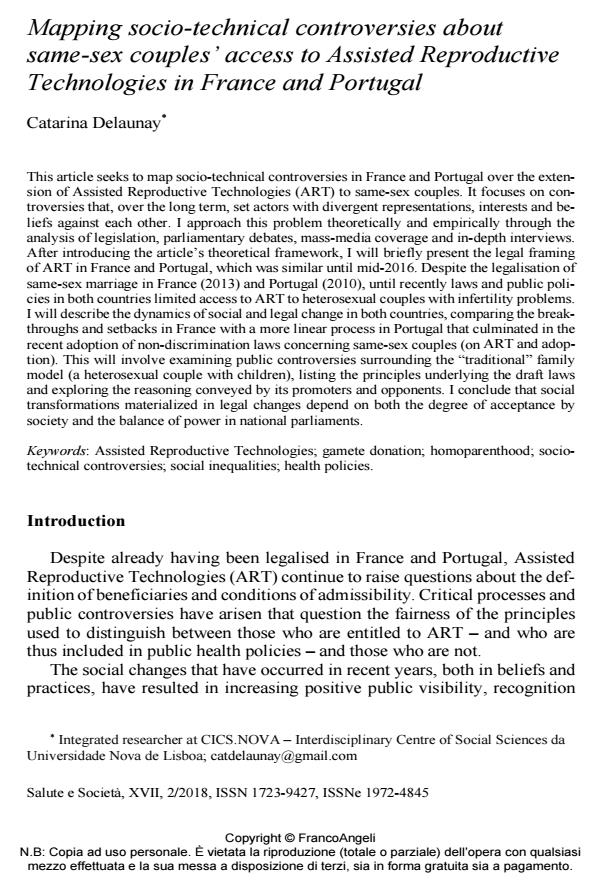Mapping socio-technical controversies about same-sex couples’ access to Assisted Reproductive Technologies in France and Portugal
Journal title SALUTE E SOCIETÀ
Author/s Catarina Delaunay
Publishing Year 2018 Issue 2018/2
Language English Pages 18 P. 72-89 File size 116 KB
DOI 10.3280/SES2018-002006
DOI is like a bar code for intellectual property: to have more infomation
click here
Below, you can see the article first page
If you want to buy this article in PDF format, you can do it, following the instructions to buy download credits

FrancoAngeli is member of Publishers International Linking Association, Inc (PILA), a not-for-profit association which run the CrossRef service enabling links to and from online scholarly content.
This article seeks to map socio-technical controversies in France and Portugal over the extension of Assisted Reproductive Technologies (ART) to same-sex couples. It focuses on controversies that, over the long term, set actors with divergent representations, interests and beliefs against each other. I approach this problem theoretically and empirically through the analysis of legislation, parliamentary debates, mass-media coverage and in-depth interviews. After introducing the article’s theoretical framework, I will briefly present the legal framing of ART in France and Portugal, which was similar until mid-2016. Despite the legalisation of same-sex marriage in France (2013) and Portugal (2010), until recently laws and public policies in both countries limited access to ART to heterosexual couples with infertility problems. I will describe the dynamics of social and legal change in both countries, comparing the breakthroughs and setbacks in France with a more linear process in Portugal that culminated in the recent adoption of non-discrimination laws concerning same-sex couples (on ART and adoption). This will involve examining public controversies surrounding the "traditional" family model (a heterosexual couple with children), listing the principles un-derlying the draft laws and exploring the reasoning conveyed by its promoters and opponents. I conclude that social transformations materialized in legal changes depend on both the degree of acceptance by society and the balance of power in national parliaments.
Keywords: Assisted Reproductive Technologies; gamete donation; homoparenthood; socio-technical controversies; social inequalities; health policies.
Catarina Delaunay, Mapping socio-technical controversies about same-sex couples’ access to Assisted Reproductive Technologies in France and Portugal in "SALUTE E SOCIETÀ" 2/2018, pp 72-89, DOI: 10.3280/SES2018-002006